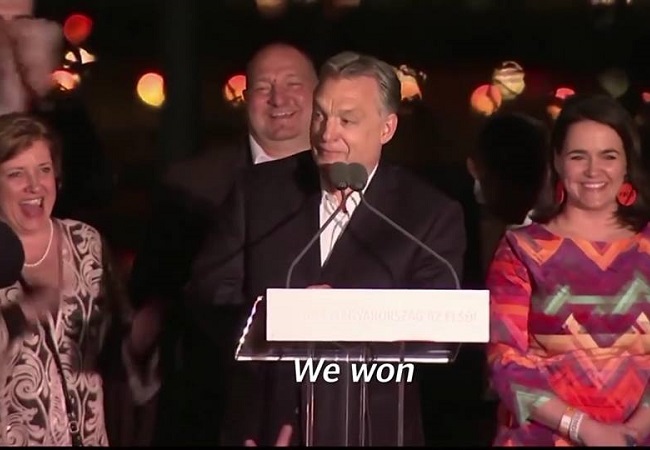Orban’s Win in Hungary Rattles EU Establishment

Prime Minister Viktor Orban’s landslide victory in Hungary’s general election has rattled the European political establishment. The three-time Prime Minister secured almost half of the vote and a two-thirds majority in the national parliament.
“Dear friends, there’s a big battle behind us, we secured a historic victory—we got a chance, we created a chance for us to defend Hungary,” Prime Minister Orban told his supporters on Sunday night.
Primer Minister Orban was widely expected to win the election, the extent of his victory, however, came as a shock to pro-EU politicians across the continent. Luxembourg’s Foreign Minister Jean Asselborn called for ‘resistance’ against the democratically elected government in Budapest.
Deputy-chief of the European Commission Frans Timmermans compared the newly elected Hungarian government to the directorial regimes of the Cold War Europe. “I’ve also come to Hungary when it was still a dictatorship.” Timmermans said, “[W]e Europeans have a strong duty to make sure that you will never, and that my children will never, see it back again.”
Writing for Germany’s state-run DW News, commentator Volker Wagener saw the Hungarian leader as a “thorn in the flesh of the EU,” who is running a “democratically legitimized autocracy.” He saw Orban running an “anti-Brussels resistance cell” within the EU geared towards revoking the “liberal consensus in Europe.”
German newspaper DIE WELT warned of a spillover effect of Orban’s victory into other EU member states, calling the rising tide of nationalism across the continent as the ‘Obranisation’ of Europe.
“Victor Orban has subjugated [sic] Hungary with his vision of ‘illiberal democracy.'” wrote Silke Mülherr while describing the outcome of a democratic election. “The election victory will give him the tailwind to export the project across Europe—and he has eager students.”
The leader of [Hungary’s] Fidesz party is skilled at appealing to the feeling of inferiority: Against the occupiers from Brussels! Against Arab migrants that threaten Christendom! Against German Chancellor who allegedly opened the borders and invited half of the world over to Europe. Orban glosses over the fact that the Russia wasn’t always nice to Hungary. The Hungarian Prime Minister courts the Russian President whenever he can–without worrying about the fact that he is thereby snubbing his official alliance partners in the EU and NATO.When it comes to using sentiments for [the sake of] politics, something Orban masterfully does, than facts don’t really count for much. The fact that Hungary would be bankrupt without EU subsidies; or hardly a Muslim refugee wants to come to Hungary; or Angela Merkel took refugees [assigned to] Orban—doesn’t play any role in Hungarian political debates. [DIE WELT, April 9, 2018] [Translation by the author]
Meanwhile, in Berlin, the reaction to the Hungarian election result exposed divisions within Chancellor Merkel’s conservative alliance, with Germany’s Interior Minister and leader of the Bavaria-based Christian Social Union (CSU), Horst Seehofer, openly cheering Orban’s landslide victory. German weekly DER SPIEGEL reported:
In Berlin the government spokesman Steffen Seibert informed that Angela Merkel has written to Orban congratulating him on the victory. Chancellor remembered the close historical ties between the two countries. It was, however, also obvious that there were ‘controversies’ when it come to mutual cooperation.
On Monday morning, German Interior Minister Horst Seehofer said that he is ‘pleased’ with Orban’s electoral victory. “It is once again a clear election victory. I will congratulate him on behalf of the [Christian Social Union],” the CSU chief said ahead of the party executive meeting. [Translation by the author]
In contrast to the establishment’s response, the news of Orban’s victory was met with elation by nationalist and anti-EU parties across Europe. Germany’s Alternative for Deutschland (AfD) was one of the first European political parties to congratulate the Hungarian leader on his reelection.
“Viktor Orban stands for policies oriented around his own people, the Hungarians. He clearly stated that he would continue those policies, and he was re-elected for precisely that reason.” wrote AfD co-chairman Jörg Meuthen on Twitter, welcoming the Sunday’s election result.
“Congratulations, Viktor Orban! A bad day for the EU, a good one for Europe,” tweeted Deputy AfD Parliamentary Leader Beatrix von Storch.
The leader of the Dutch Freedom Party (PVV) Geert Wilders also cheered the Hungarian outcome. “Congratulations Viktor Orban with this excellent result,” Wilders wrote on Twitter. “A well deserved victory!”
It is ironic to see these unelected EU officials clamoring to bring down a democratic government swept into office by a popular vote. The Establishment’s reaction once again exposes the growing chasm between the political elite and the sentiment on the European streets. The patriotic spring, as Geert Wilders like to call it, that began in eastern Europe in the wake of the Migrant Crisis of 2015 has now managed to sweep Austria and gain new political ground in Germany and France. If the European ruling elite wants to maintain their hold on power, they might consider listening to their citizens instead of slamming voters for delivering one ‘unfavorable’ election result after another.
Video: ‘Landslide victory for Orban in Hungarian elections’:
[Cover image via YouTube]
CLICK HERE FOR FULL VERSION OF THIS STORY